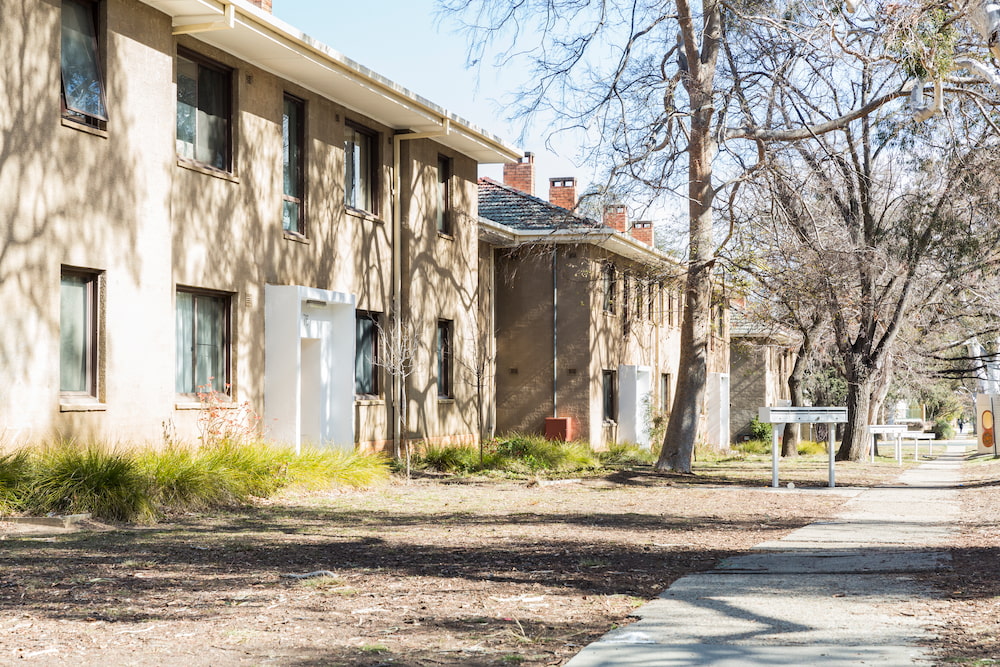The Canberra rental market is in crisis. More expensive rental prices and competition for accommodation are putting homes out of ordinary Canberrans’ reach, and community organisations fear the consequences if this continues.
For the first time in a decade, Canberra is the most expensive city in Australia to rent both houses and units, according to Domain’s December 2020 rental report. Average house rents rose $20 to $600, and unit rents to $495 a week.
The supply of available housing is low, and almost all is expensive. The estimated number of vacant rentals is 24% lower than last year, Domain stated, while less than 5% of accommodation on the market is affordable housing, Real Estate Institute of the ACT president Hannah Gill told the ABC last week.
Would-be renters are waiting weeks for a unit, and bidding above the asking price to secure a home. Others are moving out of the ACT altogether.
“This clearly shows that the market is failing renters in the ACT,” Deb Pippen, from the Tenants’ Union ACT, said. “The situation is that there are simply not enough rental properties.”
Historically, Ms Pippen said, the ACT market was always tight at the start of the year, as students and workers move to town. Some had expected this year to be different, with fewer overseas students – but the demand is still there.
The price of rentals is causing severe financial stress, according to the ACT Council of Social Service (ACTCOSS). Last year, 9,500 out of 22,000 low-income rental households in the ACT (43%) spent 35% of their income on keeping a roof over their heads. A welfare support recipient on the Disability Support Pension, JobSeeker, Youth Allowance or Parenting Payment Single would not be able to afford any private rental in the ACT or Queanbeyan region without the Coronavirus Supplement, according to Anglicare’s 2020 Rental Affordability Snapshot.
The ACT Government is well aware of the problem. “Canberra’s higher-than-average incomes mask the challenge we face in providing affordable private rental housing for families on lower incomes,” a government spokesperson said.
The government, Ms Pippen argued, should acknowledge that the market was failing, and build more public and community housing.
“Unfortunately, this is not an instant fix, but the commitment has to be made because the problem will not disappear. People will continue to move to the ACT and seek housing.”
Investment in social housing, ACTCOSS states, has not kept up with population growth and community need. The ACT has a shortfall of some 3,000 public housing dwellings; and more than 2,700 people are waiting on average three and a half years for social housing. Last year, almost 1,600 Canberrans were homeless (based on the 2016 Census; the government estimates that only around 50 are sleeping rough). That figure could rise.
“The high cost of housing, the shortage of social housing, and the low level of JobKeeper and other Commonwealth income support payments means that there is a high risk that more Canberrans will find themselves facing poverty and homelessness,” Dr Emma Campbell, ACTCOSS CEO, said.
What is the ACT government doing?
Two years ago, the ACT Government announced a 10-year Housing Strategy to supply more homes that suited tenants’ needs, and were modern and efficient; reduce homelessness; strengthen supports for tenants; increase affordable rentals; and increase affordable home ownership.

“Every Canberran, no matter their circumstances, should have access to safe and affordable housing that suits their needs,” Yvette Berry, Minister for Housing and Suburban Development, said.
To increase affordable rental housing, a spokesperson said, the government offers exemptions from land tax for landlords who rent their properties at 75% of market rate; implemented an Affordable Rental Real Estate management model, to manage properties on behalf of private landlords at below market rent; and remitted Lease Variation Charges by 25% to encourage registered community housing providers to build more dwellings.
By June, the government’s Suburban Land Agency (SLA) will have released 389 single residential blocks (including 82 affordable Land Rent Blocks) and terrace, townhouse, and apartment development sites for 1,600 dwellings.
Last year, the government sold more than 1,000 residential blocks of land for residential dwellings through the SLA, while the Ginninderry joint venture (in which the government holds a 60% share) sold 232 blocks. Forty-three blocks of land can be bought in Taylor, and 34 blocks through builders in SLA estates.
The ACT Government states that it provides the highest rate of public housing in Australia. Each year, a spokesperson said, it provides more than $141 million in rental subsidies to public housing tenants, and expects to have invested more than $1 billion in public housing over the decade to 2025.
But its public housing is also some of the oldest in the country. The government intends to renew 1,000 homes and to build 400 new ones (Growing and Renewing Public Housing Program) in what it describes as one of the largest investments in public housing per capita in Australia. The government has already renewed 1,288 properties from multi-unit public housing complexes, replaced roof-for-roof, a spokesperson said.
“Public housing is a vehicle for better lives, social inclusion, participation and stronger communities,” Ms Berry said. “Having the right mix of social infrastructure means that we are better equipped to provide people with housing that suits their needs, now and into the future.”
ACTCOSS said that the ACT Government must deliver on this promise.
In 2019–20, the government completed six new multi-unit public housing developments, including a 23-unit complex in Kaleen, and is building a 40-unit facility for women and children in Dickson. In the same period, the government made more than 500 new allocations to public housing (98.6% for households in greatest need, compared with 76.5% nationally) and almost 200 new allocations to community housing. This includes 28 rough sleepers put into permanent housing through the Axial program to end chronic homelessness.
“Housing affordability is a nationwide issue driven by a range of factors such as private investors, federal tax treatment, and low wage growth,” an ACT Government spokesperson said.
The ACT Government has urged the Federal Government to waive historic housing debts – as has been done in Tasmania – so that savings can be redirected into public housing. The ACT Government has also criticised the Commonwealth for failing to directly assist with social housing; every $100 million spent on social housing, they argue, boosts the economy by $130 million.
“Investment in social housing is a twin boost – it supports jobs, and it enables people on low incomes to access affordable housing,” a spokesperson said.
Others, however, have blamed the ACT Government itself. Mark Parton MLA, Shadow Minister for Housing and Homelessness, believes the combination of Labor/Greens policies in land supply, taxation and residential tenancies has caused the rental affordability crisis.
“For years, the Canberra Liberals have been saying that these would result in Canberra becoming firmly established as the most expensive rental city in the country and that’s where we find ourselves today,” Mr Parton said.
“I feel for everyone who is trying to get on Canberra’s rental merry-go-round and finding it nigh on impossible. It’s simply not fair that families and individuals find themselves locked out of the market through no fault of their own.”
Others claim the ACT Government has a monopoly on land, pushing up prices. The spokesperson replied that the government did not engage in practices like throttling land supply to sustain land prices (unlike some private developers). The private sector holds significant land supply, the spokesperson said – both single residential and multi-units.
Overall, in terms of unit volume, the spokesperson estimated the private sector contributed on average 33% of the multi-units (townhouses and apartments) and 41% of the multi-unit development sites.
For example, at the September quarter 2020, there were 6,022 multi-unit dwellings across 50 development sites under construction. Of this, 33% of the unit supply (1,979 units) and 48% of the development sites (24 sites) were private sector development initiatives. Over the same period, 1,409 units at 18 sites were completed. Of this, 25% of the unit supply (353 units) across 33% of the development sites (six sites) were completed on private sites.

Recommendations
Tenants’ Union ACT member Deb Pippen suggested an investigation into the application process for renters and into discrimination they faced that could lock them out of the market. To ensure renters were secure in their homes, she believes the Government must announce a timeline for removal of no-cause evictions. The Greens promised at the election to outlaw this practice, which allows greedy landlords to force tenants out if they believe they can extort higher rent from new tenants.
“Steps should be taken to ensure that the process of accessing housing is fair,” Ms Pippen said.
Dr Campbell (ACTCOSS) believes that JobKeeper must be permanently and adequately increased. The Coronavirus Supplement was reduced by $100 per fortnight from 1 January, and will end on March 31. 28,000 Canberrans now faced a bleak new year, Dr. Campbell said. A single person without children now receives only $358 a week, while a person with a child receives $381 a week.
“While many of us are lucky enough to have a job to return to after the holiday break, thousands of Canberrans are unable to find work, and cannot cover basic expenses like food and housing,” Dr Campbell said. “People receiving JobSeeker come from all walks of life. They have already been devastated by the loss of their job. The callous level of income support will force those looking for work into financial destitution.”
ACTCOSS and its members and partners, including ACT Shelter and the Community Housing Industry Association, will advocate to the ACT Government for more investment in social and public housing.
Mr Parton suggested that Labor and the Greens consider the Liberal election proposal to build another 1,200 community housing properties over the next four years. This, Mr Parton said, would have immediately dealt with the enormous shortfall, providing desperately needed market relief.
“The magnitude of this problem is so great that it should transcend party politics,” Mr Parton said. “For far too long, our community housing sector hasn’t been allowed to fulfill its potential, and it was no surprise to us that the sector fully endorsed Liberal policies. It’s not too late for Labor and the Greens to swallow their political pride, and at least talk to us about genuine game changing policy in this space.”
Advice
Ms Pippen advised people looking to rent to be aware of their legal rights. There are standard leases (tenancy agreements) in the ACT. If tenants sign leases whose terms are not consistent with the standard clauses, those terms are not enforceable unless the landlord and the tenant have jointly applied to the ACT Civil and Administrative Tribunal to have them endorsed.
Rents must be advertised at a fixed price, Ms Pippen said. If agents or landlords encourage rent bidding, this may breach Australian consumer law. Rent bidding was an unfair practice that should be prohibited by legislation as in Queensland. Although the Tenants’ Union did not condone rent bidding, Ms Pippen warned people offering more than the advertised rent to be very sure they could manage the rent, and to consider it would be increased in 12 months. Do not overcommit.
Useful numbers
Individuals and families, including young people, who are homeless or at risk of homelessness can contact OneLink on 1800 176 468.
Renters can access information about finding a rental property, standard agreements, and their rights on the Tenants’ Union ACT website (small cost for access).
Tenants who require advice can contact Legal Aid’s Tenancy Advice Service on 1300 402 512.
Canberra Community Law can assist tenants with housing law advice with regards to Housing ACT (public housing) or a community housing provider.
For more news:
- TGA formally approves vaccine on one-year anniversary of Australia’s first COVID case
- ACT HomeBuilder uptake exceeds expectations
- Early birds ‘win the day’ at Canberra’s new 5:30am Club
- ‘It’s not about raising money’: Sarge to walk 10km to raise support for Lifeline
- Nine of the best movies available on SBS on Demand in 2021



